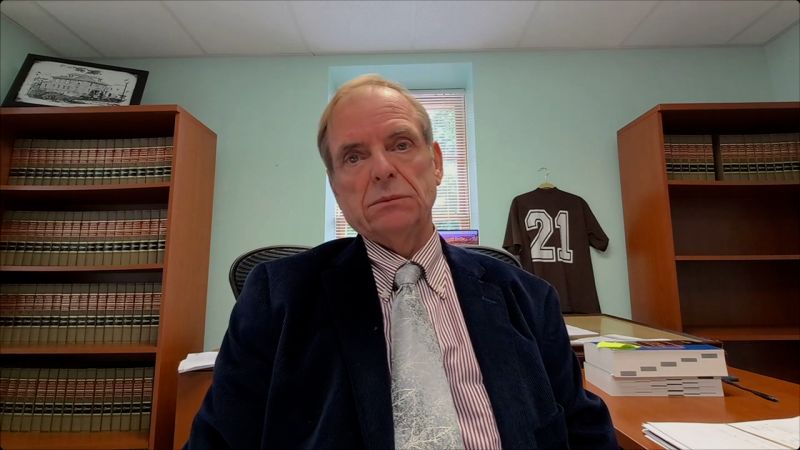Amid a constantly changing reproductive landscape, one West Virginia prosecutor is warning people who have miscarriages in his state that they could get in trouble with the law.
Raleigh County Prosecuting Attorney Tom Truman says that although he personally wouldn’t prosecute someone for a miscarriage, he made the suggestion out of an abundance of caution after hearing from other prosecutors.
Truman even suggests people might want to let local law enforcement know if they’ve have a miscarriage. Several reproductive law experts say people around the country have, indeed, faced charges related to miscarriages — but they still wouldn’t recommend reaching out to law enforcement.
Truman says the idea first came up during a chat with other West Virginia prosecutors at a conference several years ago, and it’s been been an ongoing conversation since. The initial conversation was theoretical, since at the time, women in the US still had the constitutional right to an abortion under Roe v. Wade. But some of the prosecutors believed they could charge a person using state laws related to the disposal of human remains.
“I thought these guys were just chewing on a Dreamsicle,” Truman said. But, he added, West Virginia’s legal statutes include definitions that are “pretty broad-ranging.”
The way some prosecutors may interpret the law means people who miscarry could face criminal charges, including felonies, he said.
“What’s changed is, Roe isn’t there anymore, and so that may embolden prosecutors in some cases,” he said. “I’m just trying to say, ‘be careful.’ ”
Early pregnancy loss is common, according to the American College of Obstetricians and Gynecologists, It happens in about 10 of 100 known pregnancies, often because the embryo isn’t developing properly. And some reproductive law experts say it’s probably not a good idea to call the police when it happens.
“It’s always a mistake to invite law enforcement into your reproductive life,” said Kim Mutcherson, a professor of law at Rutgers Law School who specializes in reproductive justice.
Calling police could prompt an unwanted investigation, she says.
“If they then decide, ‘no, it actually wasn’t a miscarriage, this was somebody who took pills,’ or whatever sort of thing that they want to conjure up, then all of a sudden it goes from ‘here’s this poor woman who had a miscarriage’ to ‘here’s a person who we’re going to start to prosecute,’ ” Mutcherson said.
“I understand the idea that caution is better than being caught up in something that you weren’t anticipating, but it is difficult for me to imagine any circumstance in which I would think it was safe for someone who miscarried to call the police,” she added.
Dr. Kristyn Brandi, an ob/gyn in New Jersey and fellow of the American College of Obstetricians and Gynecologists, said hospitals have processes around tissue from miscarriage — for example, sending it for further testing, disposing of it as medical waste or sending it to a a funeral home, depending on a patient’s desires.
“But in the real world, there’s no set process,” Brandi said. Patients may pass tissue and dispose of it in the garbage or toilet. Rarely, people will provide tissue for further testing. Their doctor may be able to answer questions, or Brandi said they can reach the M&A hotline, which supports people experiencing miscarriage or abortion.
“By having people report their miscarriages and possibly collect tissue, it is disrupting a process that honestly has been happening for thousands of years,” Brandi said. “There is nothing in pregnancy tissue that can determine it was a miscarriage or an abortion in a formal investigation.”
Abortion is illegal in West Virginia, but there are exceptions in the case of a medical emergency or a nonviable pregnancy, or if the pregnancy is the result of rape or incest.
Kulsoom Ijaz, senior policy counsel with Pregnancy Justice, a nonprofit focused on the civil and human rights of pregnant people, said she doesn’t believe there is anything in West Virginia law that criminalizes miscarriage.
“I think the law is pretty clear,” she said. “There’s nothing in the law that says someone can be charged with a crime in connection to their pregnancy loss or their conduct during pregnancy, or for how they respond to that pregnancy loss or miscarriage or stillbirth.”
The fractured landscape of reproductive rights that came about in the wake of the Dobbs decision, the US Supreme Court ruling that revoked the federal right to an abortion, has increased the risk that a pregnant person can face criminal prosecution for a variety of reasons, not just a miscarriage, according to a report from Ijaz’s organization.
Between June 2022 – when Dobbs was handed down – and June 2023, there were more than 200 cases in the US in which a pregnant person faced criminal charges for conduct associated with pregnancy, pregnancy loss or birth, according to Pregnancy Justice. The number is most likely an undercount, Ijaz said.
In West Virginia, there were at least three cases related to pregnancy prosecutions. In one, the state’s Supreme Court found that the state could not levy criminal child abuse charges against someone for their prenatal conduct, which included substance use during pregnancy.
Even with the strict abortion ban in place, Ijaz said, “there are still protections for pregnant people.”
In states like Alabama that have fetal personhood laws that give fertilized eggs, embryos and a fetus the “same rights as you and I,” Ijaz said, it’s a little different. “We’ve seen people get prosecuted and face decades of incarceration for substance use during pregnancy, because that fetus that they’re carrying is seen as a child,” she said.
Last year in Ohio, a woman who had a miscarriage at home was charged with a felony on the advice of the Warren City Prosecutor’s Office, but a grand jury dismissed the case.
Ijaz said that she doesn’t think there is an appetite for these kind of cases among the public but that no matter where someone lives, inviting the law into their life right after a miscarriage is ill-advised.
The legal landscape for reproductive justice “seems to almost be changing on a daily basis” – and generally not in favorable ways for pregnant people, said Brittany Fonteno, CEO of the National Abortion Federation, a professional association for abortion providers.
“The laws, the rhetoric, the culture in which we are living in within the US has become so incredibly hostile to people who experience pregnancy,” she said.
“I think that the intersection of health care and criminalization is an incredibly dangerous path,” Fonteno added. “As a country, we should be supporting people and their ability to access the health care that they need, rather than conducting intrusive and traumatic investigations into their reproductive lives.”
Fonteno recommends that people who experience pregnancy loss reach out to a qualified medical professional rather than law enforcement.
“While we are living in a very different country than we were pre-Dobbs, I believe still that this is an individual experience and a health care decision,” she said. “Most providers believe that as well.”
Mutcherson also says that the reproductive justice landscape in the US is “scary” for people who are pregnant, who want to get pregnant or who have bad pregnancy outcomes. If there’s any silver lining to the discussion about criminalizing miscarriage, she said, it’s that it’s good for people to know that such things can happen.
“Women have been criminalized for their pregnancies for decades, frankly, so to the extent that there is a wider and broader conversation about what it means to treat an embryo or a fetus as a person, and the ways in which that diminishes the personhood of somebody who was pregnant, that is in fact a valuable thing, right?” Mutcherson said. “Maybe this is actually going to bring us to a better space.”




